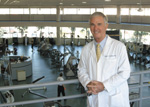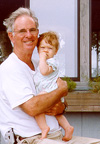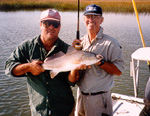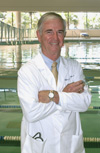A half-century of service: Gilbert B. Bradham, M.D.
Ask Gilbert Bradham, M.D., to name his greatest accomplishment at
MUSC. Is it stewardship of the Harper Student Center from the ground-breaking
ceremony until this past June? The articles and books he’s written? Or
is it his vast surgical and clinical knowledge?
 Dr.
Gilbert Bradham
Dr.
Gilbert Bradham
“I’m most proud of the friendships that I’ve been privileged to have with some of the most extraordinary people that I’ve ever come across,” he said. Colleagues and friends describe him as a driven person with vision and determination to always finish what he has started.
“I’ve been given lots of opportunities in various positions at MUSC; I’ve been fortunate in my family life, and I’ve immensely enjoyed my medical training and the training of others,” Bradham said.
Rites of Passage
A self-described “early doctor,” Bradham went to The Citadel for three
years before enrolling at the Medical College of South Carolina in 1956.
His diploma from The Citadel came 30 years later. Upon graduation from
MUSC, Bradham began a series of postgraduate fellowships and training,
including the role of chief resident at the Medical College.
 Bradham
cuddles one of his grandchildren, Hollis.
Bradham
cuddles one of his grandchildren, Hollis.
At the conclusion of his residency, Bradham ventured to the opposite side of the country to UCLA where he completed a fellowship in surgical cardiology and research in the computer sciences department. His experience with the computer system there enabled him to help install the first digital computer at the Medical University in 1964.
Once Bradham returned to MUSC, the surgeon began to pursue a variety of medical interests, including an offer from the United States Army to participate in Ranger training so that he might gain insight into lowering the attrition rate. He would eventually earn the rank of colonel in the Army Reserves.
Bradham accompanied close friend Julian Buxton, M.D., to Vietnam as a surgical consultant for the country’s civilians in 1967. “They called us consultants, but we did most of the surgeries,” Bradham said. The scariest moments he recalled were those spent dodging bullets in airplanes and helicopters.
Bradham's stop in Vietnam didn't keep him from taking care of things at home.
 Bradham
and son Bramblett beam after a fishing victory. Bramblett is one of Bradham's
three sons.
Bradham
and son Bramblett beam after a fishing victory. Bramblett is one of Bradham's
three sons.
He began his 18-year stint as the director of the peripheral vascular diagnostic facility; he served as director of the new intensive care unit, he was the senior surgery teaching program coordinator, and he began his career as a professor of surgery.
His professorship and administrative roles are what would prove to solidify Bradham’s place in the minds and hearts of MUSC students, faculty, and staff for the next 35 years.
The Crow
Although the juice bar on the second floor of the Wellness Center no
longer operates, the sign displaying “The Crow’s Nest” still proudly hangs,
almost like a testament to Bradham, fondly dubbed the “Crow” during his
years as a professor of surgery.
 Bradham
and wife, June.
Bradham
and wife, June.
“I first got to know Gil Bradham when I was a student and he was a resident,” said Layton McCurdy, M.D. “We were scared of him because he was tough and demanding. If you didn’t know the answer, he wasn’t one to let you off easy.”
McCurdy and Bradham have been colleagues and friends for years, and McCurdy cites a common interest in the mind that brought the two men closer.
“Oftentimes in the middle of the procedure I’d say, ‘I’ve done enough,’ hand the knife over to someone and say, ‘You go ahead,’” said Bradham. “He’d nearly faint, so I’d take it back, laugh, and we’d go on.”
A member of 25 medical and teaching associations, Bradham spent time during his career traveling the world to offer his surgical expertise in Russia, China, South America, and Africa.
But it hasn’t all been business. “My wife, June, and I took a five-week vacation in France recently and toured Paris, the South of France, and Normandy. It was absolutely beautiful, my favorite place so far,” Bradham said.
 A
world-renowned surgeon, Bradham’s specialty is tiny blood vessels, although
he’s operated on brains and bones. His color-coded appointment book is
a perfect representation of a man who literally finds time to do it all.
“I’ve always been very task-oriented, a common trait among surgeons,” he
said. “The only asset I have is time management. I use my time very well.”
A
world-renowned surgeon, Bradham’s specialty is tiny blood vessels, although
he’s operated on brains and bones. His color-coded appointment book is
a perfect representation of a man who literally finds time to do it all.
“I’ve always been very task-oriented, a common trait among surgeons,” he
said. “The only asset I have is time management. I use my time very well.”
Medical University Rambo
Bradham is the “been there, done that” posterchild of professional
experiences.
His experience includes professor of surgery, medical director of the Medical University Hospital, interim vice president of academic affairs, vice president of clinical services, director of the wellness center, dean of student life, and currently he’s the medical director of the Harper Student Center.
“It has been my honor and privilege to work with Dr. Bradham for the past 30 years,” said Susan Fox, Bradham’s administrative coordinator. “During this time, Dr. Bradham has provided outstanding leadership, exemplary medical care to his patients, has been a much sought-after teacher, has conducted medical research, and has played key roles in university administration.”
“I knew that Gil was a physical fitness buff, so we used to joke and call him the Medical University Rambo,” said MUSC President Emeritus James B. Edwards, DMD. “The Harper Student Center started out as an $8 million project and quickly grew to an $18 million project, but despite all of the headaches involved with it, he planned it well. Because of Gil’s leadership, we have an outstanding student center.”
Edwards proceeded to describe Bradham as an unusual and versatile person with a knack for charging ahead at full speed, as well as a lot of fun to be around. “We’ve been in business together or working together for many years, and our friendship is just as long,” Edwards said. “Once he decides that he’s going to do something, it’s very difficult to change his mind.”
One needs only to take a look around MUSC to see what happens when Bradham
gets going. His administrative career is full of achievements, like the
renovations of the 6th through 9th floors in the main hospital and the
creation of the Palmetto Pavilion.
Bradham helped to establish the helicopter system the state relies
on today, as well as the University Diagnostic Center and the acquisition
of Charleston Memorial Hospital as a teaching hospital.
Reflecting on his various positions at MUSC, Bradham mentions that the vice president of academic affairs was a challenging position, and that his stint as vice president of clinical services was a position that he loved because it was so patient-oriented. It’s easy to see that his role as the creator and developer of the Harper Student Center fills him with joy as well.
Julian Smith, director of the Harper Student Wellness Center, has worked with Bradham for 10 years. “He’s been a great boss and friend. He’s been a tremendous help in achieving goals with the Wellness Center and the Cooper River Bridge Run. He’s truly been a visionary for the university and the development of the student center.”
“He’s imminently curious. If you want to find Gilbert, he’s out on the
edge. He’s got that combination of courage and foolhardiness,” McCurdy
said.
McCurdy told the story of the two men’s involvement with a person
in the witness protection program. The two friends journeyed to a safe
house, changing cars several times along the way and then retrieved information
that the police needed for an investigation from a hysterical witness.
After the nerve-racking experience, McCurdy told Bradham that he wasn’t
doing any more “police work.”
“The most recent thing that Gil’s done for me was the role he played in rupturing my Achilles tendon,” McCurdy said with a chuckle. “I should’ve known better than to challenge him and Melvyn Berlinsky to a tennis match.”
“For more than 30 years, his loyalty, competitiveness, tenacity, and unyielding standards of excellence have helped him make major contributions in every area to MUSC becoming a world class health sciences center,” said Berlinsky, MUSC Board of Trustees member. “He’s also a friend and tennis foe, who I must admit, used these same attributes to move from novice to dominant player.”
Like a Fine Wine…
“It’s not easy to look back on almost 50 years of medical and professional
experience and say what your proudest moment was or what you feel you’ve
done that has had the most impact,” Bradham said. “I have an overwhelming
sense of satisfaction and good fortune to have attended college and medical
school and to have become a physician. I enjoyed surgery tremendously.
We were audaciously trained.”
While desiring more personal time with his children, his wife, and grandchildren, Bradham is still planning his days down to 10-minute intervals. These days, Bradham looks out for the future of the Wellness Center. His latest vision is to bring in excellent risk management services.
“Believe it or not, I love working, so I guess you can say that I do that for fun,” Bradham said. “But I’m also a hunter, a fisherman, a scuba diver, a gardener, and a traveler.”
“Dr. Bradham has been a tireless advocate for the students at MUSC. The Wellness Center is just one manifestation of his concern for improving the quality of life for our students,” Ray Greenberg, M.D., Ph.D., president of MUSC said. “He’s been a strong supporter of academic support services, such as the Center for Academic Excellence and the Writing Center. He’s accomplished so many things at the Medical University over his career, but none will be better remembered than his dedication and support of our students.”
When I reflect on my friendship with Gil Bradham at the Medical University over the past nine years, I think that he is a pioneer—a pioneer in the true sense of the word. With Gil, you always know where you stand. He is a man who speaks his mind, straightforwardly, directly, and does so because his intelligence led him to get “a real life,” not a manic pursuit of the next promotion, the bigger paycheck, the larger house. His intelligence blended with common sense (which is not so common anymore) taught him early on that none of those things mattered so much, especially if you suddenly blew an aneurysm or lost two limbs in a terrible accident or in war. Gil got a life that led him to smell the salt water pushing itself on a breeze over the Charleston Harbor, a life in which he stops and plays with his black labradors. Gil got a life in which he is not alone, but one in which he can enjoy the beauty and intellect of his wife, June. He has searched out and found others he likes. Gil has gotten a life that made him know that life is the best thing ever, and that no one has any business taking it for granted. No one has any business wasting it. And he certainly hasn’t wasted his because his list of contributions to the Medical University of South Carolina proves that. Gil learned early on not just to exist, but to live—in the operating room, in his dean’s office, in his Jeep, on his motorcycle, or curled by the fire with a good glass of wine. Gil’s life has been the one focused on the journey, not the destination. I am grateful our lives crossed, and I am even more grateful for what Gil has taught me.
—Tom Waldrep, director of the Center for Academic Excellence and
The Writing Center
Catalyst Online is published weekly, updated as
needed and improved from time to time by the MUSC Office of Public Relations
for the faculty, employees and students of the Medical University of South
Carolina. Catalyst Online editor, Kim Draughn, can be reached at 792-4107
or by email, catalyst@musc.edu. Editorial copy can be submitted to Catalyst
Online and to The Catalyst in print by fax, 792-6723, or by email to petersnd@musc.edu
or catalyst@musc.edu. To place an ad in The Catalyst hardcopy, call Community
Press at 849-1778.